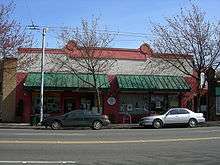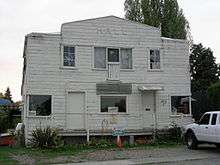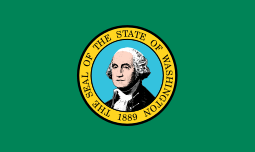Freedom Socialist Party
The Freedom Socialist Party is a far-left socialist political party with a revolutionary feminist philosophy based in the United States. It views the struggles of women and minorities as part of the struggle of the working class. It emerged from a split in the United States Socialist Workers Party in 1966.[1] The party's Seattle branch, with support from individuals in other cities, split off from the SWP over what it described as the SWP's entrenched opportunism and undemocratic methods. The party has branches in the United States, as well as Australia, Canada, England, Germany and New Zealand.[2] The current National Secretary of the FSP is Doug Barnes.
Freedom Socialist Party | |
|---|---|
.png) Logo of the Freedom Socialist Party | |
| Chairman | Doug Barnes |
| Founded | 1966 |
| Headquarters | Seattle, Washington |
| Newspaper | The Freedom Socialist |
| Ideology | Communism Revolutionary integrationism Revolutionary socialism Socialist feminism Trotskyism |
| Political position | Far-left |
| International affiliation | Committee for Revolutionary International Regroupment (CRIR) |
| Seats in the Senate | 0 / 100
|
| Seats in the House | 0 / 435
|
| Governorships | 0 / 50
|
| State Upper House Seats | 0 / 1,972
|
| State Lower House Seats | 0 / 5,411
|
| Other elected offices | 0 / 5,411
|
| Website | |
| www | |
| |
History

The immediate forerunner of the FSP was the Kirk-Kaye tendency within the Socialist Workers Part (SWP), led by Dick Fraser (Kirk) and Clara Fraser (Kaye) who were at the time husband and wife.[3] At the time Richard Fraser was seen as the central leader of the tendency due to his development of the theory of revolutionary integrationism. In addition to their distinctive position on civil rights, derived from said theory of revolutionary integrationism, the tendency also took a position that was more sympathetic to China than was the norm in the SWP, in part this being due to the alliance between the Kirk-Kaye tendency and the loser tendency of Arne Swabeck and Frank Glass.
Political differences, as articulated by the soon-to-become FSP, included what was characterized as the SWP's uncritical support of the black nationalist views of Malcolm X, SWP's orientation toward the labor aristocracy, its opportunism in the anti-Vietnam War movement, and its dismissive attitude toward the emerging feminist movement. The nascent FSP advocated the class solidarity of black and white workers, called for a greatly expanded understanding of and attention to women's emancipation, and urged the anti-war movement to support the socialist, anti-colonial aims of the Vietnamese Revolution.
The FSP became a pole of attraction for Seattle leftists opposed to the SWP's internal politics and established a home at Freeway Hall.[4][5][6] The party formed Radical Women with the dual goal of building a revolutionary socialist feminist organization and teaching women the organizational and leadership skills they were often denied in male-dominated organizations.[7]
Ideology
The FSP is politically Trotskyist. FSP leaders Clara Fraser (1923–1998) and Gloria Martin (1916–1995) built on the socialist analysis of women's oppression to create a Leninist party that is "socialist-feminist" in ideology and practice.[8][9] The party views the liberation struggles of women, people of color and sexual minorities (such as gay people) as intrinsic to working class revolt, and it looks to these specially-oppressed sectors of society to provide revolutionary leadership. Women comprise a predominant part of the party leadership. Overall, membership is very diverse and is composed of all genders and races. The party characterizes its National Comrades of Color Caucus as offering the party's diverse ranks of people of color an opportunity to work together as a team to grow as leaders and provide direction for the party's work in people of color movements.
Strategy
The party has frequently supported united front efforts on a number of issues and often helps other socialist groups get on the ballot, while simultaneously running its own candidates for office.
The United Front Against Fascism (UFAF)—founded by the FSP, but also including a broad coalition of the Left, the LGBT community, labor unionists, feminists, people of color, Jews, and civil libertarians—took the lead in mobilizing against neo-Nazis in the Pacific Northwest in the 1980s and 1990s.[10][11][12][13][14][15]

The party has branches in a number of U.S. cities, as well as one in Melbourne, Australia. The Freedom Socialist newspaper is produced six times a year. Red Letter Press publishes books and pamphlets for the party. The FSP is affiliated with Radical Women, which is an autonomous socialist feminist organization. In 2003, Red Letter Press and its managing editor, Helen Gilbert, were the target of a complaint to the Federal Election Commission by the campaign committee of perennial presidential candidate Lyndon LaRouche. LaRouche alleged that Gilbert and the FSP publishing house, which had issued a pamphlet by Gilbert critical of LaRouche's ideology and political history,[16] were in violation of campaign finance laws. The FEC found LaRouche's complaint to be without merit and dismissed it.[17]
In 2004, Jordana Sardo, party organizer in Portland, Oregon, ran for the Oregon House of Representatives in Oregon's 45th House district, earning 8.74% of the vote.[18] Other FSP campaigns have been run in New York, Washington state, and California.[19]
In 2012, the party ran a write-in presidential campaign with candidates Stephen Durham for U.S. president and Christina López for vice-president.[20][21] The ticket received 117 votes nationwide.[22][23] Eight states do not permit write-in candidates, 32 require prior registration to be an official write-in, and many do not report write-ins.[24]
In the 2016 election, FSP critically endorsed Jeff Mackler of Socialist Action for president.[25]
In 2018, the party announced that member Steve Hoffman would seek to petition onto the ballot for United States Senate against incumbent Democrat Maria Cantwell. Hoffman got 7,390 votes (0,4%) and did not advance to the general election.[26]
References
- Alexander, Robert. International Trotskyism, 1929-1985: A Documented Analysis of the Movement. Duke University Press, 1991, p. 936.
- "Where We Are". Freedom Socialist Party. Retrieved 4 November 2019.
- Sheppard, Barry (2005). The Party: The Socialist Workers Party, 1960-1988, Volume 1. Resistance Books. p. 104.
- Crowley, Walt (2010). Rites of Passage: A Memoir of the Sixties in Seattle. University of Washington Press. pp. 21–22.
- Winslow, Barbara (2007). "Primary and Secondary Contradictions in Seattle: 1967-1969". In Rachel Blau DuPlessis, Ann Barr Snitow (ed.). The Feminist Memoir Project: Voices from Women's Liberation. pp. 227, 230–231, 235–236.
- McKay, Ian (2005). Rebels, Reds, Radicals: Rethinking Canada's Left History. Between the Lines. p. 242.
- James, Edward T., Janet Wilson James, Paul S. Boyer. Notable American Women: A Biographical Dictionary, Volume 5. Harvard University Press. p. 414.
- Love, Barbara J. (2006). Feminists Who Changed America, 1963-1975. University of Illinois Press. p. 158.
- Ware, Susan; Stacy Braukman (2005). "Martin, Gloria". Notable American Women: A Biographical Dictionary, Volume 5: Completing the Twentieth Century. Harvard University Press. pp. 414–415.
- Kubelbeck, Amy (Aug 4, 1990). "Groups Of Gays Protest Picnic". The Seattle Times. Retrieved 2013-03-17.
- Lacitis, Erik (1991-07-16). "An Ax To Grind -- When It Comes To Skinheads And Nazis, Loggers, Gays Unite". The Seattle Times. Retrieved 2013-03-17.
- Angelos, Constantine (1990-05-19). "Rice, Citizens Groups Join To Declare Seattle Won't Tolerate Hate Crimes". The Seattle Times. Retrieved 2013-03-17.
- Gough, William (Dec 8, 1991). "A Gathering Of Neo-Nazis -- Encampment Draws Protest". The Seattle Times. Retrieved 2013-03-17.
- Reang, Putsata (Oct 2, 1996). "Supremacist Guilty In Klan Scuffle -- Federal Way Man Broke Free- Lancer's Camera". The Seattle Times. Retrieved 2013-03-17.
- Wilcox, Laird (2002). "Who Watches the Watchmen?". In Jeffrey S. Kaplan, Heléne Lööw (ed.). The Cultic Milieu. Rowman Altamira. pp. 334–335.
- Helen Gilbert, "Lyndon Larouche: Fascism Restyled for the New Millennium", Redletterpress.org
- "COMPLIANCE CASE MADE PUBLIC". Federal Election Commission. November 4, 2004. Archived from the original on August 31, 2009. Retrieved August 24, 2009.
- "OR State House 45 Race - Nov 02, 2004". Our Campaigns. Retrieved 2016-01-29.
- Linda Averill, Freedom Socialist, October 1998, "Enthusiastic support puts radicals on the ballot in four states"
- Durham/Lopez campaign website, Votesocialism.com
- Ballot Access News, January 29, 2012, "Freedom Socialist Party Nominates its First National Ticket".
- The Green Papers "Votes for Stephen Gaylord Durham".
- Ballot Access News "New York State Posts Final 2012 Election Returns Tally; Presidential Vote Increases by 400,332 Votes".
- ""Planning to write in Paul Ryan or Bernie Sanders? It won't count in most states."". Washingtonpost.com.
- "This Year of the Detestable Election, exercise your democratic rights with a protest vote!". Socialism.com. October 2016. Retrieved 30 July 2018.
- "Union stalwart and socialist feminist Steve Hoffman runs for U.S. Senate". Freedom Socialist Party. Retrieved 13 January 2019.
External links
| Wikimedia Commons has media related to Freedom Socialist Party. |
Archives
- Freedom Socialist Party Seattle Branch Records. 1984-1992. 3.14 cubic feet.
- Melba Windoffer Papers. 1933-1990. 7.42 cubic feet (8 boxes). Contains records from Windoffer's service with the Freedom Socialist Party.

.svg.png)